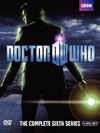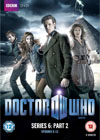DVD Extras (box sets only) include:
Here we have another fast paced, densely populated, mystery episode from Steven Moffat to add to the convoluted River Song saga and tie up the issues surrounding the season's high noon confrontation. Though delivering highly entertaining and riveting material all the way through, it's all too easy to sift the events of this story into two piles: those that are solidly real and tying up the season arc, and those that exist in their own fictitious fantasy bubble and have little relevance to anything.
Well, it is interesting and different to resolve the arcs of the season in a single episode instead of a two-parter, although in this format perhaps it was best that one of the biggest reveals (although slightly obvious by now) bled backwards into the end of the previous story to become a cliffhanger. Perhaps the move was really worth it though. After all, we got four previous episodes with River Song this season, setting up the events we will resolve and introducing many of the major players of the story. I still would have preferred more two parters in the season, but this story didn't necessarily have to be one of them. Also, when you think that both "Bad Wolf" (the season 27 finale) and "The Sound of Drums" (the season 29 finale) might have worked better if the best bits of those stories had been condensed into one episode, perhaps this story is the result of a similar move after some excess has been removed. If so, good.
But of course, he needs to explain it to the audience via another character, and I'm not as keen to see that Winston Churchill gets to be that character while the Doctor gets a goofy soothsayer look. It still works okay, and Ian McNiece plays Churchill very entertainingly. It's just not close enough to my tastes for me to rave over it.
Although Madame Kovarian is a great character and I enjoy having her perspective in this story, her presence is a bit of a waste from a plot point of view. Moffat has the lead villain tied up for her entire time on screen? Come on! Of course Marcus Wilson is going to be dead right thinking that her end isn't big enough - how can it be after that? Plus, she only appears in the fake time bubble, so nothing that happens here counts for anything anyway. Out in the intergalactic spheres, she's still just as present and scheming and deadly as ever. This story is such a waste in so many ways. The story appears to make some kind of sense if you only look at its superficial levels while letting it zip by quickly. But scratch beneath the surface, and most of it falls apart fairly completely. One of the biggest questions is why the Doctor bothered to marry River Song when he did. It doesn't look like it happens for love, or as a natural consequence of his relationship with her, whatever that bizarre relationship really is. In fact, he even has a line at an earlier point, where he says "I don't want to marry you." Yes, he did get tricked into making a promise about marriage five episodes ago. But surely other things were more pressing during this adventure. Yes, the Doctor has a plan, and he needs to convince River to cooperate, which he does with a judo-like move of giving in to her argument that people love him, and then using that momentum to his own advantage. But it still feels like an unnecessary shortcut to go from that idea to marriage, since a simple "look deep into my eyes" could have sufficed, and there are only artificial scripting considerations for keeping that a secret from anyone. Perhaps Moffat is unhealthily obsessed with the idea of marriage - indeed he's now put it into two season finales. Or perhaps he's just bagging some unwanted rumours about River into a fantasy bubble, which the audience can choose to believe in or not. I choose not to. I think it's an unfortunate compromise, where those who just want good sci-fi are wondering why it's here at all, while those like Alex Kingston who look forward to her character's wedding thought it fell far short of what they hoped for. In the end, it looks like the Doctor is just manipulating River, much the same as he did to Cameca back in "The Aztecs" (story no. 6), only this time it's more deliberate and less forgivable. More importantly, the complications of the second half of this story are grossly lacking in mechanisms that we can invest in. How does River Song override the controls in the suit to discharge her weapon instead of shooting the Doctor's Tesselecta? I understand the mechanics of his plan, but I understand nothing of hers. And how the hell does this create that wonky bubble universe of 5:02 pm Greenwich time forever? (Which incidentally would be about 10:02 am in Utah.) I'm not buying that crap about fixed points in time... which just sounds like fairy tale jargon used to prop up a pretty shaky theory of time in the first place. Indeed, the entire scene atop the pyramid is so problematic. It wants to show a big important debate, yet the emotions poured into it feel so out of place and redundant because the stakes are intangible and ridiculous - who can really follow the temporal babble about fixed points, disintegrating time, and the planet in peril of fatal death that attempts to support those emotions? Who in the audience really has beliefs that match those that are paraded on screen? Moffat even admits it's guff on the commentary - so how can we get worked up over it? This is probably the biggest mistake of the finale, boiling all the events in the frozen time bubble down to another "Adventure That Didn't Really Happen".... all part of some psychopath's deluded dream, whether that be River Song's or Amy's dream, or one they shared together. This is all making Rory seem like the only sane companion the Doctor has lately. It's actually been a good year for him.
Perhaps the additional scenes and Moffat's own interviews say it best though, as I suspected last year. Moffat's real concern is with untrustworthy memories, which is cool, and worthy of exploration, and I'm right there for it. Blaming alternate memories on the idea of time re-writing (or worse, fixed-points creating fantasy bubbles) isn't going to cut it though - best to reveal that as a red herring one day. I'll give you the theory that I'd believe. All versions of time occur, and a person's doubles in each separate branch of time live through those various versions of their lives. Normally, they each only remember the one they've experienced. A person's soul, however, remembers ALL of the different possible outcomes as having happened. Presently, not too many of us humans know how to communicate with our souls on purpose, but if memories from your double's life bled through the common interface of the soul, you would start to "remember" multiple versions of events, and multiple versions of your lives. Maybe some of that is going on here. I'll easily buy that, especially if a person gets to see something of each different parallel/branching universe, as Amy often does. I just think it's a totally unnecessary hang-up to think that one version ceases to exist if you witness or create or move into one of the other versions. Wiser minds know they all continue to co-exist, and you can avoid trick questions and make better choices when you know it.
For ranking purposes, it is the early intergalactic sections, the other parts of the Utah lake scenes that we hadn't had before, and the pyramid imagery that will keep this story afloat, since all are fairly worthy. The rest is pretty empty over-hyped fluff that I can't truly invest in, as pleasant and attention-grabbing as it turned out to be - and with the fluff being so plentiful and inexplicable, it will drag this story down to be the lowest ranking episode that Moffat has written this season.
International Titles:Deutsch: "Hochzeits-Song"Magyar: "River Song esküvője"Français: "Le Mariage de River Song"Русский: "Свадьба Ривер Сонг"Italiano: "Il matrimonio di River Song"
Season 32 Rankings:
This story has become available on DVD and Blu-ray. Click on the Amazon symbol for the location nearest you for pricing and availability:
Note: The full season sets contain commentaries, behind-the-scenes featurettes, and other extras. The smaller volumes feature little more than the plain episodes. Comments on this article are welcome. You may contact the author from this page:
|
||||||||||||||||||||||||||||||||||||||||||||













